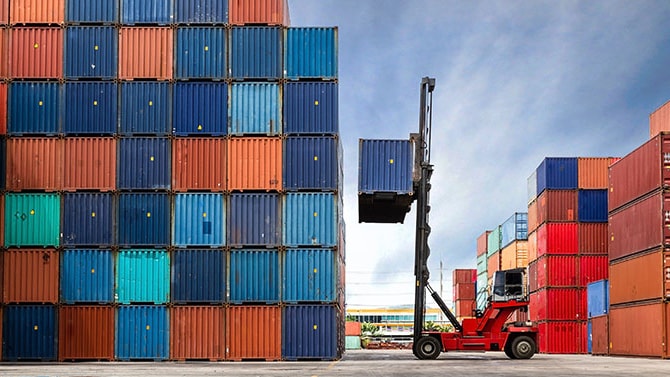{{item.title}}

Customs matters are a critical factor in effectively managing international trade operations, and their significance extends beyond mere operational considerations. Managing customs effectively is essential, especially given the intricate and ever-changing international landscape that governs the import and export of goods, as well as the pressing need to address sustainable development and digital requirements within the supply chain.
Our team comprises customs, excise, and environmental tax experts who can assist you in ensuring compliance with internal processes while navigating the dynamic and frequently evolving regulatory framework.
As part of the global PwC network, we offer integrated solutions that are creative, efficient, and cost-effective, aiming to minimize the impact of duties and taxes.
Whether it's for imports or exports, the tariff classification assigned to goods plays a pivotal role in determining various factors such as customs duty rates, trade policy measures, security standards, and health or phytosanitary requirements. Accurate customs classification is essential, as non-compliance with regulations can result in significant civil and criminal penalties.
It is crucial for operators to handle tariff classification with the utmost care, and we can help you navigate this complex process.
Understanding and properly applying the rules of origin for goods can be a complex and diverse task for operators. It is crucial to comprehend these rules to benefit from tariff preferences offered under the free trade agreements established by the European Union. Origin is not only important for tariff advantages but also for labeling products as "made in" and complying with anti-dumping measures. The correct determination and utilization of goods' origin are significant factors that can be both advantageous, in terms of benefits obtained, and risky from a financial and reputational standpoint if mishandled.
Custom valuation, which serves as the taxable basis for calculating import duties and taxes in most cases, can be highly complex to determine, considering the transaction’s circumstances and any elements that may need to be included or excluded from the price charged by the foreign seller.
Special customs procedures offer the opportunity to import third-country goods into the European Union with the suspension of customs duties, value-added tax (VAT), and trade policy measures.
These procedures are designed to facilitate operations such as stockage, processing, or specific use, providing potential financial gains as well as logistical advantages.
Certain products qualified as strategic or posing particular risks are subject to specific formalities when exported. These can include weapons, military equipment, and dual-use goods with both civilian and military applications. Additionally, countries may impose sanctions to counter aggressive actions. These measures are complex and involve both economic sanctions (import and export prohibition, restrictions for certain services and contracts, etc.) and individual sanctions (travel prohibition and asset freezing).
Non-compliance with these regulations can result in severe penalties. It is crucial to have a comprehensive understanding of the applicable regulations.
The Authorized Economic Operator (AEO) authorization is a trusted label granted by Customs administrations to operators who demonstrate a thorough understanding of customs regulations, effective flow management and a sufficient security level of the supply chain. Becoming an AEO offers several benefits to companies, including:
Furthermore, the European Union has signed mutual recognition agreements with partner countries (such as the US, China, etc.) providing for equivalent advantages.
Environmental taxation has emerged as a prominent challenge in recent years, driven by the rapidly evolving societal expectations. Political initiatives aimed at promoting environmental sustainability have proliferated, placing greater emphasis on the role of economic actors in mitigating environmental impacts.
This primarily concerns energy excise duties levied on the sale or use of certain products (formerly known as Domestic Consumption Tax on Energy Products (TICPE), Domestic Consumption Tax on Electricity Supply (TICFE), Domestic Consumption Tax on Natural Gas (TICGN), and Domestic Consumption tax on coal (TICC). It is important, however, to note that environmental taxation also encompasses various mechanisms related to natural resource protection, pollution control, and carbon emissions.
In accordance with the polluter-pays principle, the concept of “Extended Producer Responsibility” (EPR) provides that product manufacturers and distributors can be held responsible for managing waste throughout the life cycle of a product. The implementation of an EPR system involves the transfer of responsibility, costs, and waste management to the “producers.”
Today, EPR takes the form of various eco-contributions for different products categories, including electrical and electronic equipment, packaging, paper, textiles, furniture, tires, tobacco products, toys, mineral oils, etc. These eco-contributions represent a significant compliance challenge for businesses, both in terms of potential penalties and reputational impact.
Alcohol and tobacco products are subject to a unique regulatory framework that imposes complex financial and administrative obligations on businesses. This includes obtaining specific authorizations tailored to the nature of transactions involved. Additionally, stringent obligations are in place to ensure the traceability of products subject to excise duties. It is crucial for operators to achieve full compliance with these regulations to avoid potential civil and criminal penalties.
A department recognized in rankings
An international network that is leading and interconnected
A robust methodology for tailored support with innovative solutions
Possible integration with various PwC capabilities (Tax, Social, Accounting, Finance, etc.)


TVA & Indirect Tax Lawyer, Partner, PwC Société d'Avocats
Tel: +33 6 08 88 87 11





